
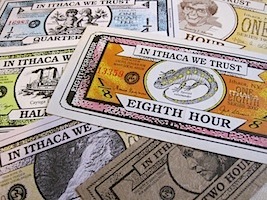


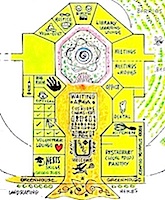


 |
 |
 |
 |
 |
  |
| PAUL
GLOVER ESSAYS: community control of food, fuel, housing, health care, planning, education, finance.
|
| HOME | INTRO | CURRENCY | SUCCESSES | HOW-TO BOOK | PUBLICITY | ESSAYS |
|
TYPES OF ORGANIZERS
Everyone is a community
organizer. You've already organized something: a family meal,
a workweek, vacation, church social, maybe even a get-out-the-vote
campaign or demonstration. All organizing skills are needed,
basic or fancy. Like listeners, artists,
web developers, filmmakers, musicians, dancers, writers, speakers,
pray-ers, inventors, investors, entrepreneurs, donors, saints or
statesmen. We're all part of some network and we all help
connect people. Everyone has something to contribute.There are many styles of organizing. manifestos, press conferences, videos, protests, costumes, theatre, door-to-door, websites, blogs, pickets, takeovers, blockades, committees, congresses, consensus For my part, whenever I've seen a need I've set the table, and the public brings the feast. 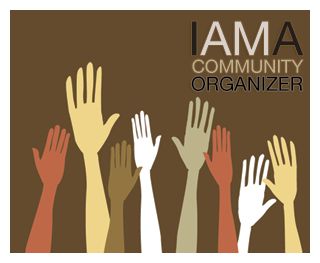 |
TYPES OF POWER
There are several types of
power. Consider which types you need, to advance your visions.There's formal power, and there's informal power. Formal clout is governmental (courts, legislatures, elections, military, regulatory), financial (cash, loans, stocks, bonds), technological (central electric plants and grid), educational (standards and credentials). Formal power usually takes the form of official-looking sheets of paper, but paper is ultimately backed by brute force: threats to foreclose, repossess, confiscate, sue, arrest, jail, bomb, disconnect, excommunicate, execute. Informal clout relies instead on voluntary influence. You've heard the sayings "the power of a good example," "knowledge is power," "power in numbers," "spiritual power." There's also the power of language, of music and art, celebrity, health, sex, media, networks (especially the internet), imagination and unity. As well, natural resources like oil, gold, metals, farmland and water embody powers that cause armies to march, and empires to rise or fall. The more of these powers you can combine to serve your plans the likelier you'll take root. But start with what you have. It will grow. "Find out just what the people will submit to and you have found out the exact amount of injustice and wrong which will be imposed upon them; and these will continue until they are resisted with either words or blows, or with both. The limits of tyrants are prescribed by the endurance of those whom they oppress." -- Frederick Douglass, 1857 |
|
TYPES OF ACTION
Your greatest leverage for change rises from your nonviolent campaign to define orderly change. That's ideal idealism. This book emphasizes legal nonviolent strategies and plans because killing is permanent, and once killing starts it multiplies. But perhaps you are impatient for power. When your family or community are about to be crushed, you'll likelier consider the full range of urgent actions; from legal to illegal, from nonviolent to violent. Sometimes you'll need complete immediate revolution-- whereby all power shifts from Them to You, and everything is suddenly entirely different. The alternative to systematically and nonviolently rebuilding America is not pretty. When nonviolent protest fails to secure homes, food, health care and jobs, history shows that rebellions take what is needed. Rather than watch their children die of hunger or disease, the poor sooner or later rebel to survive. Playgrounds of wealth are invaded by desperate masses seeking food and shelter. Some will justify violence against property, when that property is about to do great harm. Violence against humans or other animals is a terrible last resort. Governments demand a monopoly on violence and punish freelance violence. But Americans have repeatedly used violence-- to establish the United States, free slaves, gain the 8-hour workday. Since violent acts can backfire badly, it's better to confront a problem earlier, while legal and nonviolent tactics can prevail. These enable your creative alternative to be enacted. Nonviolent illegal action, like civil disobedience, has a long respected role in social change. Civil disobedience has been an essential part of gaining civil rights. It can be used to gain moral force, which adds political leverage. People resort to this when they realize that, when they follow the proper channels, they're channeled to dead ends. Most laws are made in the streets, by outspoken demand, then ratified by legislation. Lawbreaking is sometimes justified by invoking the "Necessity Defense," which asserts the necessity of breaking a law to prevent even greater harm. For many, obedience to higher laws is superior to uncivil obedience. We Americans have our rights to speak and assemble, to trial by peers, to carry arms, to worship any god any way, to vote and to revolt, because millions have taken these risks. All current laws began by breaking old laws. Our Bill of Rights began when English nobles confronted the King to demand trials by jury, then when jurors risked their lives to defy the King's verdict. |
Then
the following happen: armies of police are dispatched to crush endless
uprisings. Civil liberties are extinguished. Rich
and poor alike live
in a police state. Costs of police and prisons rise beyond
reach.
Brutal dictators arise to punish dissent. They drag their
nation into
foreign wars and civil wars. Rich and poor die in bombings,
kidnappings, famines, epidemics. Revolution overthrows
dictators, then
is corrupted.
|
|
THREE
BASIC STRATEGIES:
1) COMMUNITY MAGIC ACT. Proposing new ways of meeting needs is more powerful than opposing. Establish local and regional models that prove humans can work together to make society better rather than worse. These show that the public is prepared to use power responsibly-- that we do not need to depend on destructive forces. This is the high road, essential but not sufficient. 2) GIVE PEACE A CHANCE. Without compromising your goals, offer a carrot to authorities. Show how they can benefit by helping lead or by yielding. This reassures the general public that you are constructive and reasonable, even when your offer is declined. 3) THE ART OF THE THREAT. Most of us prefer to be polite. It's nicer to be nice. But it is very impolite to quietly tolerate injustice. So wave a stick. You have more power than you think, when you carry an effective threat. |
 One can confront individuals politely, while making institutions tremble. You can legally threaten to nonviolently sink their company or project. Let's take a closer look: |
|
1. COMMUNITY MAGIC ACT
Who are the powerful? Who are world leaders? You are. You can make the rules that rule the rulers. All nations and businesses and revolutions began around a campfire, kitchen table, or keyboard. Sometimes, to shape progress, we just drop a note into the suggestion box. Most often, though, we need to prepare a longer campaign. The purpose of an organization is to rally those who will help and be helped. Organizers feel the pulse, proceed on a hunch, make a plan, take a chance. When seeking help to promote a cause you get magic: people join who are team players or loose cannons. All offer something necessary. 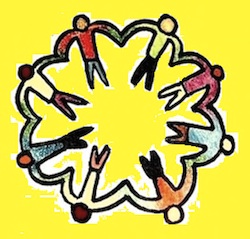 PARALLEL AUTHORITY PARALLEL AUTHORITYWhen urgent needs are resisted, citizens can combine formal and informal power by asserting parallel authority. In America you can, with more courage than cash, legally create your own money, courtroom, religion, health plan, radio station, commission, militia, legislation, foreign policy, political party, labor union, or bank. Multiply such grassroots groups by thousands and you have real democracy. I call this underthrowing the government. Here are some personal experiences: 1. Need money? Print your own. In the MONEY chapter I'll describe the local currency I developed for Ithaca, New York. It's legal because it doesn't look like dollars. But millions of dollars worth have been traded. 2. Can't afford health insurance? Start your own nonprofit health co-op. I started the Ithaca Health Alliance, whose members paid $100/YEAR to be reimbursed for 12 categories of everyday medical emergency. They own their own free clinic. See HEALTH chapter. 3. Are you being ignored by City Hall? When bureaucrats neglected our plan for bike lanes, I started the Bicycle Planning Commission. Giving yourselves official titles gets their attention. The mayor soon brought the renegade Commission into City Hall, with official status and budget. See TRANSPORTATION chapter. 4. When a major university was about to build a $2 million incinerator that would have sprayed dioxins that cause birth defects and cancer, I created a media campaign that contributed to its swift abandonment. See AIR chapter. 5. Do transportation planners threaten to plunge an elevated four-lane highway into your town's heart? You can bring it to a halt, even when all major employers and officials have endorsed it. See TRANSPORTATION chapter. 6. Several doctors visiting Dr. Patch Adams' Gesundheit! Institute said that in their countries they were not permitted to clown for children in hospitals, because they were not 'official' clowns. So I invented the Gesundheit! Institute of Clownology, made official colorful credentials to be signed by Patch. They worked. See HEALTH chapter. 7. A friend and her boyfriend were turned away from a fancy restaurant because he was not wearing a tie. Since I lived nearby they came asking to borrow a tie. I had none, so I cut blue cardboard into the shape of a tie. It worked. 8. Police have a tough job. They're expected to be friendly and diplomatic and ready to shoot. They patrol sniffing for rotten things people do. So I started a police department whose deputies issued citations when they saw people doing good things, like "waiting for a friend." Several people said they framed their citation. See PUBLIC SAFETY chapter. 9. Investors pour money into Wall Street, where many companies damage communities and nature. So I drafted the Philadelphia Regional & Independent Stock Exchange (PRAISE) to gather capital of all kinds for eco-development. See BUSINESS chapter. 10. When the local daily and weekly papers repeatedly printed last-minute lies about our preferred candidates, I created an email news broadcast. With 8,000 locals enrolled-- half the households-- we were prepared to rebut lies. See MEDIA/CULTURE chapter. 11. Depending on the two major political parties is like tolerating just two TV channels. Start your own political party to spotlight your ideas. Done right, you can scare RepDems and get concessions. See GOVERNMENT chapter. 12. Want to magnify your voice? The media and public may ignore just another protest march. But they are drawn like fruit flies to novelty. With some creativity you can bring the world's attention to your cause. We'll make you famous in the MEDIA/CULTURE chapter. THE CAMPAIGN Whatever you believe, there are some who agree. As a community organizer, you can start or join groups that fill gaps, on behalf of community, ecology and social justice. I find the people who are excited to make good change, then I gradually move on. Being a leader means knowing when to lead and when to follow. Sometimes I stay until the board makes it clear they own the organization-- I become happy to be outvoted-- reassured that the group will continue without me. I've followed other leaders and been inspired by them at least as much as they have looked to me. I'll elaborate on these in the chapters that follow. CHECKLIST FOR STARTING AN ORGANIZATION OR BUSINESS 1. MAKE A PLAN. Begin by deciding what basic need you'll serve. Will your group be local, statewide, national, global? Sketch a simple plan for meeting the need, based on the skills and resources of potential members. Give your group a name. Then make a website. To make the name easy to remember, invent a clear acronym. I've started PRAISE, NESTS, POP, LUV. If you're a nonprofit, incorporation is optional. 2. MEET REAL NEEDS. Like food, housing, heating, healing, jobs. Really meet the needs, rather than merely meeting about them. When people are fed, housed, heated, healed or employed they will fight beside you and fund you. Make a list of benefits to members and to the larger community. 3. GO BOLD. What are your big headlines? What images grab the eye and pull? Put these together above the fine print. There are so many public causes competing for attention that clear direct talk distinguishes your message. We'll look closer at this below. When attacked, respond based on your values and the public's needs. Be proud of the names they call you-- do not mumble appeasing demurrals. 4. MAKE FRIENDS. Make a list of groups that seem likely to agree with some part of your plan. Start to contact them. Don't be surprised by surprises: some likely opponents will help; some likely allies may yawn. You'll develop generic flyers, but each of these groups deserves a special appeal. Following pages show samples of focused outreach. Begin with who is ready to begin. Keep the doors open-- I have repeatedly worked alongside people I've earlier battled, when interests overlap. Distribute literature personally in public places, to get feedback. Answering questions sharpens your pitch. You can best speak the language of the public by tabling, to explain your plan and answer questions. This process develops a crisp efficient rap, enabling you to speak to the press in 15 second bites, 30 seconds and one minute. It's good to be able to talk like a lawyer, a saint, a news broadcaster, a street tough, or suburbanite. Announce a time and place for the first public meeting. Issue a press release about the meeting, the group, and its purpose. |
5. TRAVEL LIGHT. The more you own or
owe, the more you are controlled. Fancy offices, fancy
equipment, fancy salaries require steady income from foundations and
large donors, who prefer polite advocacy. That requires
compromise. So decide what you really need, diversify your
income, reduce your dependence on dollars. Your mission will thrive by relying on informal, in-kind income for office space, food and transit. There's lots of free office equipment available. Publish a newsletter and sell ads. Print your own credits. Barter with members and customers. When your networks are strong enough, you might employ someone primarily through donated apartment, health care, local food, bicycle, movies. Pricey membership and events repel the people you most need. The public must be able to afford to participate. Bylaws are thus strongly recommended which stipulate a maximum wage for employees that's not more than twice the region's livable wage. This will ensure that employees are hired who are more attracted to the mission than to money. You want people who are excited to make life better for all. 6. STICK TOGETHER. Within any group there will inevitably be misunderstanding, disagreement, power struggles, romances. Once I served on a board of directors who loved our mission and each another, until state officials pushed us into combat mode. So cultivate love and teamwork, but be ready to agree to disagree. Better than exploding and becoming enemies, subdivide into two or more related organizations, then form a coalition. This allows divergent strategies to complement rather than frustrate. 7. DECENTRALIZE AUTHORITY. Relying on one great leader makes the group vulnerable to burnout, betrayal, assassination. Remember that everyone contains creative genius and that an ultimate goal of all activism is a society where that genius is celebrated. Therefore, cultivate several media spokespersons. The most powerful whistleblower of all time was not Julian Assange of Wikileaks, but the global network Anonymous. 8. SURF THE CURVE. New conditions and new information require new plans. Successful social movements nimbly adjust tactics (short range action) and strategy (big picture) to run rings around bureaucracy. 9. BE HONEST. Otherwise, why bother? Try to be a personal example of the values you promote. This is tough. 10. BE FUN. Whether opposing genocide or planting gardens, people need to party. HOW TO PROMOTE YOUR PLAN NOVELTY. What is different about your plan than any other? Advertisers call this the Unique Selling Proposition, and it applies as much to organizing social change as to selling cars. The difference is that while advertisers hype junk, you're offering genuine benefit. When starting the Philadelphia Orchard Project (POP), for example, I didn't say merely "We're planting some fruit trees." I raised a stunning vision of orchards everywhere, with dynamic economic and social benefits. We were not just another garden club, but a movement to reconstruct Philly's economy and culture. I posted a critique of vacant land use; asserting that creating jobs feeding people is more urgent land use than condos. So within eight months we were featured by a half page article in the New York Times' Real Estate section. Likewise, starting the Patch Adams Free Clinic carried the combined novelties of Patch Adams' name, solar-powered earth-sheltered design, training for healing, farming and self-help. DRAMA: How does your plan contrast with official plans? When promoting simple bridges as an alternative to a 4-lane highway, my cartoon posters were headlined "Why New Rte 96 is a Bad Idea" and by contrast "Why Plan A Bridges are a Good Idea." The League of Uninsured Voters (LUV) rallies the most powerrless Americans to confront the most powerful, and to take that power from them. MEDIA: Just as media can pump you up or deflate your program, you'll discover the power to make others famous or infamous. Through Ithaca HOURS local currency, housewives, small businesses, politicians, bigshots and little kids took their turns on national and global TV. I provided media with strategic lists of particpants to interview, to reinforce local loyalty to the program. For example, the Italian couple interviewed on Italian TV about their pizza shop were seen by their relatives in Italy. Keep in mind that, when speaking with media, if reporters like you they'll report favorably even if they don''t favor your idea. A reporter from a major newspaper was so relentlessly skeptical that I realized he had some personal problem. So we got drunk and talked about his hard times. He opened up, then wrote respectfully. Send press releases for every milestone: membership goal, major endorsement, proven benefits and testimonials. Reach out via social media and YouTube, but rely on the neighborhood festivals and grapevine, meetings, regular media, graphs, flags, banners, movies, articles, unusual actions, testimonials, endorsements. And if it can't be a cartoon it can't be a social movement. Simplifying your message to a cartoon reaches the broadest audiences. I've included several of my cartoons in most chapters. BENEFITS Just as with commercial advertising, social change needs to appeal to our natural needs for love and sex, belonging, prestige, safety, adventure, family and pleasure. Here's a sample list of why a neighborhood might welcome a new free clinic: BENEFITS TO NEIGHBORS * Quick access to free primary care: medical, dental, optical + referrals * Green jobs training * Youth programs * Fresh food and farmers' market * Meeting spaces * Recreation areas: basketball, volleyball, soccer * Picnic areas * Pageant areas, Flea market * Spinoff customers for neighborhood businesses * Community trade and barter network * Safer streets: defensible space * Investment in land trusts * Volunteers for the above * Media sees neighborhood problems & solutions * Spirit of hope, power, fun LETTERS TO EDITORS Show confidence by writing concisely and authoritatively. There's a tendency when attacked to defend at length, but be briefer than your attacker. Likewise, humorous and ironic (but not sarcastic) work better than mere diatribe. Challenge clearly, promote clearly. Blunt is better. Here are a few examples of my replies to attacks. Names have been changed. [LINKS]
NATURAL ALLIES Here's a short list of some likely and unlikely allies. The full list is far longer. artists (musicians, dancers, writers, painters), African-American organizations, alternative/holistic healers, anarchists, anti-poverty organizations, peace organizations, blogs, Chambers of Commerce, child advocacy groups, cities, civic associations, churches, mosques, synagogs, conservatives, college grads, consumer advocates: PIRG, counties, doctors, downtown business associations, festivals & events, food co-op, Greens, homeowners' associations, immigrant aid, conservatives, liberals, Libertarians, libraries, list serves, medical centers, medical societies, newspapers, neighborhood organizations, radio, service workers, Latino groups, small business associations, tax relief organizations, TV, unions. |
|
2. GIVE PEACE A CHANCE
Occasionally, Goliath and David share interests. Crocodiles and lions declare truce at shrinking water holes. Little wrasse fish feed by cleaning barracuda teeth. Lemons become lemonade. Win/Win.  So look for a way to convert an enemy
into an asset. Invite them to enjoy giving you
power. Win/Win can be rare, but it's worth a shot.
Saves your energy for the most essential fights. Such as when
your antagonist is going to drain the town lake tomorrow.
So look for a way to convert an enemy
into an asset. Invite them to enjoy giving you
power. Win/Win can be rare, but it's worth a shot.
Saves your energy for the most essential fights. Such as when
your antagonist is going to drain the town lake tomorrow.Usually you'll collide with corporations that want what you have, because they want everything. Yet it seems to me that the rich can get as much money from making the world safer and more beautiful for their children, rather than surrounding their children with wars, prisons and poisons. Let's therefore invite them to help Americans reduce the cost of living, and of government, by investing in neighborhoods directly. Rather than merely servicing and controlling neighborhoods, institutions would gradually transfer economic power and land to them, through genuinely nonprofit mutual aid systems. These allow neighbors to purchase high-quality, low-cost building supplies, insulation, paint, housewares, plants, health care, solar panels, food. Neighborhood land trusts and sweat equity stabilize housing prices and expand ownership. As living costs decline, discretionary income expands, feeding neighborhood enterprises. More about them in the JOBS chapter. Some successful win/win examples. 1. We wanted the local hospital to give discounts to members of our health co-op, and we wanted them to accept community currency. The right time to ask arrived when the hospital had just canceled their contract with Blue Cross, and an outsider medical system invaded their territory. They also wanted to promote their holistic Pain Center among many locals who were relying on holistic modalities. So they joined us after a couple discussions. They've since gotten lots of good press and free advertising, as the hometown hospital that accepts local currency. 2. The Chamber of Commerce sought credibility with local small businesses and nonprofit organizations. Our community currency sought credibility with certain mainstream businesses. By joining the Chamber, notwithstanding its anti-union and anti-environmental policies, we each gained standing among one anothers' members. We became a restraining influence on their anti-labor declarations, while inviting them to describe to media the environmental benefits of shopping locally. Meanwhile, they got millions of dollars worth of free tourist publicity worldwide. Collaboration differs from compromise to the extent that you maintain financial independence,and readiness to speak out regardless of reaction. When publishing a newspaper editorial against Wal-Mart I invited pro-Wal-Mart advertisers to cancel their ads, but they did not. 3. The Patch Adams Free Clinic sought free land, neighborhood acceptance, and building permits for its solar earth-sheltered health center. Here's a sample flyer: WIN WIN WIN
WIN WIN WIN The Patch Adams Clinic benefits ALL of us: Taxpayers Local Medicaid expenses reduce as low-income folks own their own preventive care. Businesses Less taxes for subsidizing indigent care means more that can be spent with you. Philadelphia can become more famous for solutions than for crime. Sick and Injured Quicker care, more time for care, less paperwork. Doctors and Healers More time for care, community credits, less paperwork, sincere gratitude. Rich and Poor The rich will live in a safer, healthier world. The poor will more easily advance. Powerful and Powerless The powerful will find fewer hassles managing the costs of dysfunction. The powerless will become proud contributors to society. Conservatives and Liberals Strong Americans mean a stronger America. Co-op care extends care to all. Blacks, Whites, Latinos, Asians, Native Americans,Young & Old. We're growing well together! |
Several
institutional adjustments are therefore needed to facilitate healthy
transitions: MAJOR EMPLOYERS would embrace job sharing and flextime, and consider the benefits to themselves and society of six-hour days without reduced pay. Kellogg's thrived on this basis for 54 years. All employers would end racial bias in hiring and invest in workers as assets (even as friends) rather than as costs. Research shows that labor productivity and yearly business growth are highest in countries where income is most equal (Economist 11/5/94 p.21). TRICKLE DOWN NEEDS BUBBLE UP: America's dominant model for economic development is skyscrapers and condos, gentrifying, prisons and wars. America's income gap hobbles all of us, by requiring higher taxes to control crime; to subsidize housing, heating and electric; to fund Medicaid and Food Stamps. At the same time, billions of dollars of wealth bleeds yearly from America's economy, lost to contracts to firms abroad. Were we to retain this money and reduce the basic costs of living, lower-income residents would have more money with which to purchase goods and services. Purchasing from regional suppliers is essential to economic progress Unit costs reduce as regional green manufacturing expands. 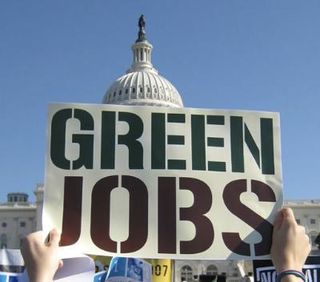 GOVERNMENT
power to shop locally and hire locals is a major economic
engine. Municipal and state ownership of vacant lands and
buildings, gives regulators great power to empower
neighborhoods. Building codes can be amended to
encourage greywater systems, compost toilets and solar envelope
zoning. Government expands green tax credits rather than tax
breaks, bailouts and below-cost sale of raw materials. GOVERNMENT
power to shop locally and hire locals is a major economic
engine. Municipal and state ownership of vacant lands and
buildings, gives regulators great power to empower
neighborhoods. Building codes can be amended to
encourage greywater systems, compost toilets and solar envelope
zoning. Government expands green tax credits rather than tax
breaks, bailouts and below-cost sale of raw materials. Many local governments are catching on to better kinds of job development. They've quit chasing franchises. St. Paul, Minnesota, for example, started a Homegrown Economy Project. Eugene, Oregon hosts the Buy Oregon project, which finds local contractors to bid for regional manufacturing subcontracts. The New Economy Project of Littleton, Colorado built economic development from inside. Their research showed that 90% of new jobs are created by local business. The federal study "Local Economic Development Tools" concluded that expansion of local firms through import replacement programs can generate ten times more jobs than imported capital.  BANKERS
would open branches in poor neighborhoods and learn that small loans
are actually likelier to be fully and promptly repaid.
India's Grameen
Bank has proven the superior safety of
small loans to low-income people. This requires an end to racial and
class bias in lending. BANKERS
would open branches in poor neighborhoods and learn that small loans
are actually likelier to be fully and promptly repaid.
India's Grameen
Bank has proven the superior safety of
small loans to low-income people. This requires an end to racial and
class bias in lending.SCHOOLS would become exciting again by teaching all students how to become powerful community managers and creators of jobs, as well as active union and co-op members, rather than obedient drones. MEDIA would use their cultural power to inspire trust and enthusiasm for the future, rather than fear and dread.  PLANNING DEPART-MENTS
would become public resource and innovation centers, welcoming new
ideas, promoting equitable development. PLANNING DEPART-MENTS
would become public resource and innovation centers, welcoming new
ideas, promoting equitable development. |
|
3. THE ART OF THE THREAT
Business and government can be powerful
forces for good, but often block progress. Their reflex is to
grow and dominate. When authorities stand against you, you'll
need to take decisive action.You can help them, as above, and you can hurt them. Your nonviolent threats promote nonviolent alternatives to violent conditions that others might otherwise violently overthrow. Nonviolence is extremely powerful and preferable. But let's be clear-- marches, speeches, petitions and conferences are not by themselves a revolution. They blow off steam but do not take power, unless accompanied by powerful enforceable threats. That means they'll cause significant embarassment, loss of money or votes. When watching one million Americans march in New York City against nuclear weapons, Defense Secretary Alexander Haig said, "Let them march all they want, as long as they pay their taxes." Moral arguments and superior plans are essential but greed often ignores them, without threat. And 'Hope' is another word for Weak-- we 'hope' the powerful will listen to reason and be nice to us. However, it rarely works that way. Win/win strategies, without some threat, often lead to loss. Even genuinely nice corporate managers are just part of the machine. Behind all diplomacy must be an effective threat. So take the high road but use studded tires. You prefer friendly resolution beneficial to all but are ready and willing to slam dunk. Never overtly threaten violence. It scares away friends and emboldens opponents. Yet capacity for violence is the unstated bottom line. Mahatma Gandhi was not executed by the British, because they feared the revenge of the masses. And note Henry Kissinger's reply to Richard Nixon when Nixon proposed martial law in 1973. "Mr. President, the American people won't tolerate martial law, and the American people are armed." Attack values and ideas, not humans. It's more effective, too. When opponents like you they lose the determination that personal grudge provides. They can sooner admit defeat. And they'll actually respect you for knowing the game, even while angry at you for winning it. PREPARING THE THREAT
Assess the situation. What do
they desire, and what do they need? That's their
vulnerability. Then pick your fight, select your target.Sample Effective Threats See AIR chapter, see TRANSPORTATION chapter, see HEALTH chapter. Here are examples of your leverage: 1) You can threaten corporate revenue. They crave money. When you touch their wallet you'll touch their heart. Where do they get their money? From customers, government, bankers, investors, mafia, alumni, community donors, foundations, inventory, lawsuits, pensions, real estate, taxes, tourists, and theft. Find out who owns them. Start by searching nasdaq.com. Enter their company symbol and look at "detailed institutional holdings." Prominent owners of nearly all stocks include largest oil companies, drug companies, tobacco and communications companies, and major banks. Some groups buy a couple shares so they can introduce tough shareholder resolutions at annual meetings. Find out who they own: go after weaker subsidiaries. Find out where their markets and customer base are strongest and weakest. Find out where they get their raw materials. |
2) Corporate reputation. Profits can be challenged
with boycotts, demonstrations, divestment, safety. 3) Authority. Some folks crave authority even more
than money. From
presidents to petty bureaucrats, they like to be "deciders."
3) Authority. Some folks crave authority even more
than money. From
presidents to petty bureaucrats, they like to be "deciders."4) Personal reputation. The toughest among them seldom care what the public cares about them, but they care what their golf buddies and children think. Some of these folks are surprising susceptible to criticism and ridicule. 5) Personal employment. They need to effectively defend the corporate bottom line. Remember, though, evicting a dictator or legislator or CEO is powerful only when it sets the stage for implementation of your plans. Otherwise, it just changes faces, not policies. 6) Luxury. Their toys are extensions of their egos. Their car is their second skin. Their yacht is paradise. 7) Liberty. They own lawyers and even judges. That's why there are few millionaires in jail. That's why tobacco is allowed to kill 440,000 Americans yearly, while trillions were spent to not find Osama bin Laden. DELIVERING THE THREAT. Your threat will have more impact if they hear about what you're planning from a third party rather than from your group directly. It reveals that something ominous is happening beyond their control, that your group is resolute, and that they'll need to negotiate to prevent serious damage. When to Negotiate: Negotiate only from strength, never as mere petitioners or protesters. Never believe politicians, corporate flacks or advertisers, even when they are occasionally sincere. No matter how reasonable or likable, they are mere tranquilizers for corporate domination. When you doze they will bulldoze. Negotiate only when beneficial, not just to be nice. For example, after our anti-highway group had clearly won, City Hall asked us to join a committee to negotiate, giving our group official status. They were like beggars offering us dirt, but our group, over my objection, accepted their offer. This revived the debate. The argument continued 13 years before we won. The decisive threat, finally, was to waste DOT's time, forever draining resources from higher priority projects and construction companies. Where to Meet: their turf or your turf or neutral turf. Official places where they're officials. If you meet at their offices, get there early and sit in their official chairs. Better to meet on your turf or neutral grounds. Get agreements in writing then watch them like hawks. When to declare victory: Define success. Know when to declare victory. win and lose gracefully, to lay groundwork for next challenges. |
|
How Elites Resist Change
Whenever grassroots activists challenge destructive governmental/corporate action, they face a sequence of resistance which generally goes like this: 1. IGNORE YOU: "This is not worth discussion." You have perhaps invited them to fix the problem quietly. They refuse. So go to the press. 2 "AGREE" BUT NEGLECT: "We care about (animals/good pay/trees/human rights) and you can be sure we'll take care of this matter." Nothing substantial follows. The greedy will pretend to care about community, nature, peace, jobs, babies or kitties, only to the extent that common people prevent them from stealing. Turn your back on these corporations and your jobs get exported, your homes get foreclosed, your children are sent to war and forests converted to condos. 3. TELL YOU YOU'VE BEEN RUDE AND ACT HURT: "We think you're being irresponsible, and unfair to us; we work very hard here on difficult questions, and you don't understand the realities of this situation." Just say it back to them. You have a right to your opinion. 4. RIDICULE YOU: "Apparently you eco-beanies think you know more than the experts, all of whom have decades of experience in this field. Perhaps you'd like to calculate the transverse extrapolated trajectories of anastomized regurgitant." Reassert your facts and values. Yours are superior when they support community and nature. 5. CALL YOU BAD NAMES: Rulers have scared the public from social change by pointing at anarchists, communists, Catholics, Irish, Blacks, Chinese, Muslims, and now terrorists. Long ago at a Chamber of Commerce meeting a businessman shouted at me "You're a communist!" Replying as though this were a schoolyard taunt I said "No, YOU'RE a communist!" He laughed, and we shook hands. 6. KICK UPSTAIRS: to higher level authority, like an Environmental Impact Statement or survey: "An expert panel has concluded that when rich people get richer, the poor benefit." Hired experts will conclude what they're hired to conclude. 7. KICK DOWNSTAIRS: We can't proceed without the agreement of all parties. You'll have to argue it by yourselves." This is divide and conquer: jobs vs. environment, middle class vs. poor, whites vs. blacks, men vs. women, pedestrians vs. bicyclists, etc. 8. CREATE COMMITTEE AND APPOINT YOU: "It's time we establish an orderly procedure for considering these questions, so that your concerns will be properly considered and implemented." This is a great way to pull your teeth. You're asked to "compromise" or "be reasonable." As a deliberate outsider you need not be polite. 9. BUY LEADERS: "You've become so well known to us that we think you deserve employment with our firm." Also known as co-opting. 10. LIE: "Today America's heroic Air Force pilots dropped cluster bombs to protect the freedom of children on the ground." Nazis believed that "people will believe a big lie sooner than a little one; and if you repeat it frequently enough people will sooner or later believe it." 11. LEGISLATE: "We have lobbied to enact laws to protect this rare deer in such a manner to protect our profits." You need to draft your own law and plans. 12. THREATEN to sue, sanction, expel, arrest, jail, kill: "You have three minutes to leave the building, then we'll arrest/shoot." Their lawsuits to intimidate dissent are called SLAPP suits: Strategic Lawsuits Against Public Participation. Some states punish SLAPP suits. 13. YIELD, THEN WAIT: They give up, temporarily. "Let them take over. After a while they'll self-destruct." You need to be ready to show you can serve the public better. ALWAYS REMEMBER THAT YOU HAVE A RIGHT AND A DUTY TO PROMOTE YOUR VALUES AND TO CONTRIBUTE FORCEFULLY AND NONVIOLENTLY TO PUBLIC DISCUSSION. THOSE WHO TELL YOU OTHERWISE ARE "ANTI-AMERICAN. |
BREAKING THE LAW
TO REPAIR THE LAW  Good laws are good for society. They rise from the people to require fairness. That's what American laws are for. That's the American Way. Ever since Liberty and Justice for All were made Constitutional, many federal, state, or local laws were enacted that defy Americanism. Is the USA the Land of the Free? Only if we make it so. Are we the Home of the Brave? Only if we are. That's because tyranny is the natural order, which only fierce public demand controls. Laws overwhelmingly protect the rich from the poor, more than protecting the poor from the rich. Though lawbreaking is a last resort, most of the following laws were changed by being broken. o Owning slaves and whipping them. o Hiring little boys in coal mines and working them 14 hours/day. o Hiring little girls in textile mills and working them 14 hours/day. o Working adult laborers 14 hours/day, 7 days/week. o Prohibiting Jews, Irish, Chinese, Italians, or Blacks from living in white neighborhoods. o Prohibiting blacks from marrying, swimming, drinking, eating, or learning with whites. o Prohibiting teaching African-Americans to read. o Permitting public hangings. o Permitting dangerous working conditions. o Permitting massacres of Native Americans. o Permitting imprisonment for debt. o Prohibiting non-property-owners from voting. o Prohibiting women from voting. o Prohibiting women from wearing bathing suits that showed ankles or knees. o Prohibiting teaching about birth control. o Prohibiting teaching about Evolution. o Prohibiting neighborhood radio stations. o Prohibiting criticism of the President. o Prohibiting criticism of foreign policy. o Prohibiting shopping on Sundays. o Prohibiting kissing. o Prohibiting dancing. o Prohibiting beer or liquor sales or use. Some laws continue the tradition of anti-American legislation: o Permitting pre-emptive wars. o Permitting warmaking without Congressional approval. o Permitting destruction of water by industry, fracking, clearcutting, sewage overflow, fertilizers. o Permitting imprisonment without trial. o Permitting cruel or unusual punishment. o Prohibiting paroled felons from voting. o Prohibiting Americans from pooling funds to share health costs. o Prohibiting unionizing. o Prohibiting criticism of food products. o Permitting tobacco while prohibiting marijuana. o Permitting unlimited election campaign contributions. o Permitting torture. o Permitting carcinogens in food and water. o Permitting poisoning of rivers. o Permitting clearcutting of forests. o Permitting nuclear power. o Permitting vivisection. o Permitting usury o Permitting corporate job theft to offshore. o Permitting eminent domain for private benefits. o Permitting corporate ownership of public airways. o Restricting demonstrations to "protest zones." |
| Forgiveness Since we've all acted like serious jerks, some time or other, we're alive today because people remembered they've been jerks too, and forgave us. That our species continues is tribute to the billions of invisible daily decencies that override the millions of daily insults. Seems to me that when people are trusted and told they're good, we'll often try to act better. And when we feel respected socially, and safe economically, we're less quick to lash out. Therefore we start community organizations that make it easier for people to respect and help each other than to hurt one another. The Ithaca HOURS local paper money has brought people together as new friends, lovers, and political allies. The Ithaca Health Alliance brings generosity and humanity to health services, by enabling members to pay for one another's everyday emergencies, and to staff their own holistic/allopathic free clinic. The People's Police Department patrolled for the good that folks are doing. Ithaca Community News provided an email campfire for thousands of local people who prefer good news about one another. Citizen Planners of Los Angeles invited neighbors to join Research & Action Groups that design and implement urban ecology. |
 The Philadelphia Orchard Project (POP) seeks to convert Philadelphia's 40,000 vacant lots into edible space, by gathering the skills, tools and enthusiasm of neighbors. Within such communities of mutual aid, when serious social mistakes are made they are usually less frequent and less tragic. Let's assume that very bad stuff will always happen. Humans will dish it out and take it. But, retreated to safe distances and surrounded by restraining hands, forgiveness heals us all. |
 |